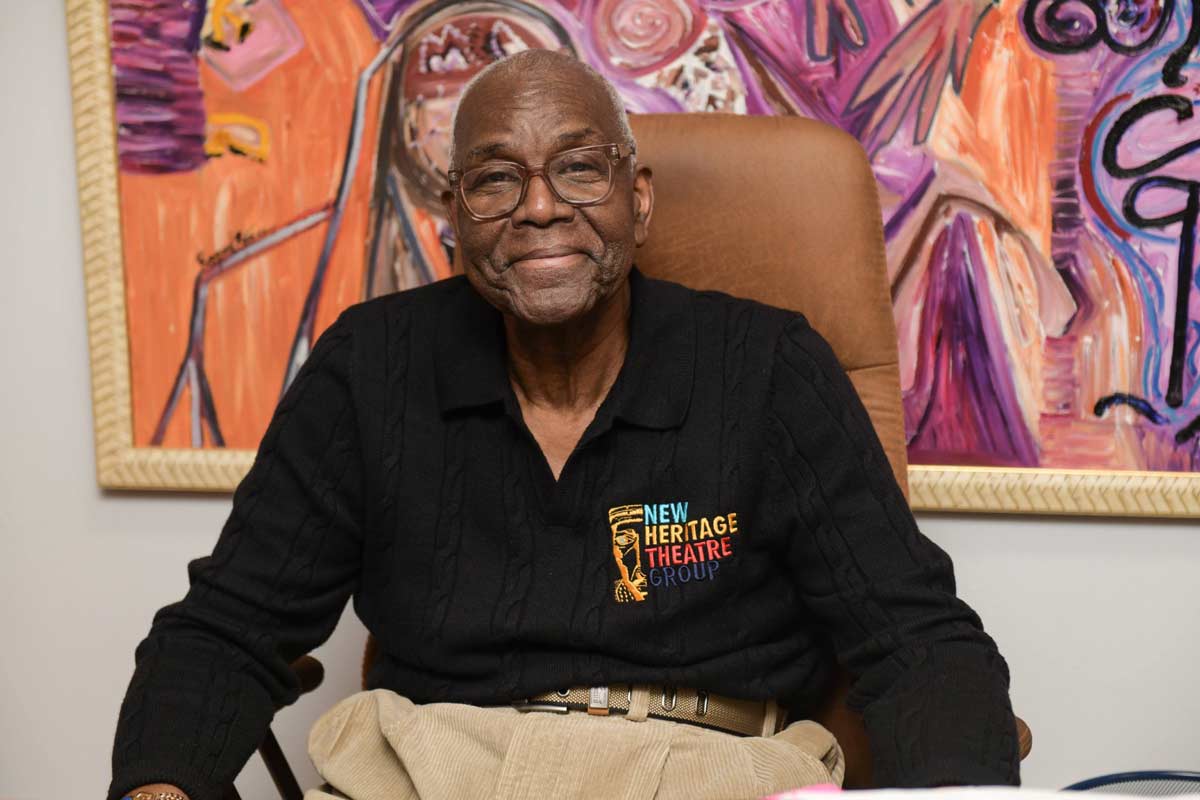
Republished by Our Time Press
By Fern Gillespie
Harlem is always on Voza Rivers’ mind. Born and raised in the heart of Harlem, Rivers has blended his love of the arts and his managerial skill to showcase Uptown as a leader in Black culture. Whether it’s his leadership at Harlem Week, Greater Harlem Chamber of Commerce, New Heritage Theatre or the Apollo Theatre, Rivers is acclaimed as a creative innovator.
“Wherever I travel, people are asking me about Harlem,” Rivers, 82, told Our Time Press. “We inherited the reputation for being the cultural capital of Black America.” Rivers has presented Harlem productions across the United States and worldwide in Japan, South Africa, Togo, Nigeria, Cuba, Canada, and the United Kingdom.
A man of many accomplishments and many power positions, a few of his many Harlem-based titles include: first vice president of The Greater Harlem Chamber of Commerce; co-founder, executive producer and vice chairman of Harlem Week; founding member and executive producer of the New Heritage Theatre Group, the oldest Black theatre company in New York State; chairman of the Harlem Arts Alliance; chief operating officer the Apollo Records; executive producer for the Apollo Theater in Japan; executive producer and co-founder of IMPACT Repertory Theatre; former chairman of the board of directors of arts nonprofit Community Works; executive producer of Harlem’s Gertrude Jeannette’s The H.A.D.L.E.Y. Players theatre and . vice chair of the Coalition of Theatres of Color.
When Our Time Press spoke to Rivers, it was three days before the death of his lifelong friend and colleague Lloyd Williams, age 80. Over the last 50 years, these two men have been instrumental in promoting and nurturing Harlem. “I’ve known Lloyd almost 70 years when we were Boy Scouts together St. Martin’s Church.
His godfather was Malcolm X,” said Rivers. “In terms of the partnership that we’ve had over all these years with the Greater Harlem Chamber of Commerce, where he is the president and I’m the 1st vice president.” The Greater Harlem Chamber of Commerce focuses on economic development. It owns 12 affordable housing buildings between 124th and 136th Streets.
Both Rivers and Williams were part of the founding team for Harlem Week in 1974, under the leadership of Percy Sutton. Williams was the chair and Rivers is the co-chair. “It is a tribute to our way of honoring our role models being Percy Sutton, Charlie Rangel, Hazel Dukes, David Dinkins and Basil Paterson.
These guys were mentors to us,” said Rivers. “This is our 51st year. It’s an opportunity for Lloyd Williams and I to look back at the journey that we have taken from being connected to Percy Sutton as of one day event. Last year, for our 50th anniversary, we wanted to capture the significant cultural, social, educational and spiritual events that happened over that period of time.
We have grown tremendously from that initial one-day Sunday afternoon when we renamed Seventh Avenue in honor of Adam Clayton Powell Jr. Changing Seventh Avenue to Adam Clayton Powell Boulevard was the first time in the history of New York City that a street would be named after a person of color.”
Rivers is mentoring the next generation for Harlem Week productions. “When you think about what is Harlem Week, you think about the leadership and all the young people that came through and worked with us,” he said.
“We feel very pleased that we had the foresight and the energy to create something that captures our past and present.” Since COVID, Harlem Week has showcased the event both virtual and on stages across Harlem. The virtual component has landed a phenomenal 3.6 billion views.
During Apartheid in South Africa, Rivers who is the longtime executive producer at New Heritage Theatre, in Harlem and reached out to South Africa’s leading Black theatre companies. “We were very, very successful because the first play we did opened up the door. It was “Woza Albert.” Because of that play, the Lincoln Center and Joseph Papps Public Theatre people came up to Harlem to see the work.
The second play was “Asinamali!” I was denied an opportunity to go to South Africa by the South African government to see the play, because they said that I supported the dismantling of their apartheid system. So, they didn’t allow me to get a visa.
The South African theater group, Committed Artists, was relying on me to bring a second play into the United States. I brought “Asinamali!” into the United States sight unseen–just based on listening over the telephone to their rehearsals in South Africa.
I brought the show to our small theatre in Harlem on 125th and Lenox Ave sight unseen.” Harry Belafonte, Quincy Jones and Miriam Makeba came to Harlem to see the came to the South African performers. Within a year, “Asinamali!” went to Broadway and earned a Tony Award nomination.
Working with Lincoln Center and the South African Company, Committed Artists, Rivers helped bring the acclaimed “Sarafina” to Broadway. “Sarafina” was a South African musical by Mbongeni Ngema about the 1976 Soweto uprising against apartheid by young students who protested the mandatory use of speaking White South Africa’s language Afrikaans in the school. On Broadway, it earned five Tony nominations. Rivers had a ten-year producing relationship with Lincoln Center.
Currently, like many Black leaders in the arts, he is concerned about the impact of the Trump anti-DEI movement on Black culture and grants. “Right now, during this particular time our government is putting an “X” on DEI programming. Most of our cultural organizations produce DEI productions and presentations,” he said.
“That’s what we are about. That’s a part of our history and legacy. And yet we find ourselves being penalized if we continue to do that because the government has put a moratorium on our type of programming.”
Together with producer Jamal Joseph, Rivers continues to promote and nurture young Black talent. They created Harlem’s IMPACT Repertory Theatre for people between the ages of 12 and 19. Several years ago, the talented teens created a song for the movie “August Rush,” that was nominated for a best music Oscar and Grammy.
“It’s a kind of institutional memory of what’s we’ve done. We have been connected to the young people and teaching them grandma and grandpa values and sharing our stories,” he said. “That’s part of the existence for us.”
To celebrate “The Magic of Harlem Week” through August 17, visit www.harlemweek.com and for more information on New Heritage Theatre, visit www.newheritagetheatre.org

